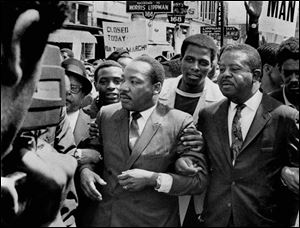
45 years after Martin Luther King shot, '50 days of nonviolence'
4/4/2013
In this March 28, 1968 file photo, Dr. Martin Luther King Jr. and Rev. Ralph Abernathy, right, lead a march on behalf of striking Memphis, Tenn., sanitation workers. Forty-five years after Martin Luther King Jr. was killed supporting a historic sanitation workers strike in Memphis, the citys garbage and trash collectors are fighting to hold on to jobs that some city leaders want to hand over to a private company.
ATLANTA — The 45th anniversary of the assassination of civil rights leader Martin Luther King Jr. will be marked on Thursday with the launch of a campaign against youth violence in his hometown of Atlanta and a labor union rally in the city where he was killed.
The King Center in Atlanta said it would honor its namesake by kicking off “The 50 Days of Nonviolence,” a challenge for youth to abstain from violence for the rest of the current school year.
“As my father said, ‘The choice is no longer between violence and nonviolence. It is either nonviolence or nonexistence,’” said Bernice King, the civil rights leader's daughter and chief executive officer of the King Center.
“We believe young people have a leadership role to play in creating a nonviolent society,” she said.
Bernice King will speak outside the center on Thursday at 7:01 p.m. EST, the exact time her father was assassinated on April 4, 1968, in Memphis, Tennessee.
A wreath will be placed on the front of Ebenezer Baptist Church in Atlanta, where King had preached, in the same spot where one was placed the day after his death.
King, who advocated nonviolence, racial brotherhood and equal rights, rose to international prominence after leading the Montgomery bus boycott, which began in December 1955. He went on to win the Nobel Peace Prize in 1964.
In 1968, he traveled to Memphis to support sanitation workers who were striking against unfair working conditions and low pay. King was shot and killed while standing on a balcony outside his room at the Lorraine Hotel. He was 39.
James Earl Ray, a segregationist, confessed to the assassination but recanted shortly afterward and tried for years to get a new trial. He died in prison in 1998 while serving a 99-year sentence.
The hotel is now home to the National Civil Rights Museum, which on Thursday will commemorate King's death with a labor union rally, wreath laying and panel discussion including Alvin Turner, a retired sanitation worker who participated in the strike.
“It's been 45 years since the assassination, and it's been 45 years that the country's struggle has continued for equality and freedom,” said Barbara Andrews, director of education for the National Civil Rights Museum.
Members of the American Federation of State, County and Municipal Employees labor union, which organized the 1968 sanitation strike in Memphis, plan a march from the local union office to the museum, union spokesman Chris Fleming said.
Martin Luther King III, son of the late civil rights leader, is scheduled to speak at the rally, Fleming said.